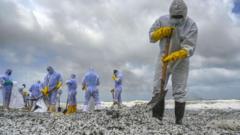Recent mining activities in Raja Ampat have raised concerns about environmental damage, prompting the Indonesian government to revoke several mining permits. While this decision is celebrated by conservationists, fears linger regarding potential reversals due to ongoing mining interests.
Environmental Impact of Nickel Mining Threatens Raja Ampat's Biodiversity

Environmental Impact of Nickel Mining Threatens Raja Ampat's Biodiversity
The Indonesian archipelago, known for its rich marine life, faces environmental degradation due to nickel mining essential for electric vehicle batteries.
The Raja Ampat archipelago, often referred to as the "Amazon of the Seas," is under increasing threat from nickel mining activities, which are essential for electric vehicle batteries and stainless steel. Activists and environmental organizations like Global Witness have released aerial images showcasing the detrimental effects of this mining on one of the planet's most biodiverse marine ecosystems. They reported a significant rise in land usage for mining, with losses exceeding 500 hectares between 2020 and 2024.
Recently, the Indonesian government has taken a decisive step by revoking permits for four out of five mining companies operating in this region, citing the need to protect the rich biodiversity that has earned Raja Ampat its world heritage status. However, while this decision has been celebrated by some conservationists like Dr. Mark Erdmann, there are concerns that legal disputes from the mining companies could lead to changes in this policy. One company has been allowed to continue operations inGag Island, home to valuable nickel deposits, although the government has promised to restore any ecological damage caused.
Mining practices pose a dual challenge as they meet the growing demand for essential minerals while posing risks to the environment. Reports indicate that Indonesia has become the frontrunner in nickel production, accounting for over 50% of the global output. This surge in demand for critical minerals such as nickel has visible implications not only on local ecosystems but also on water and air quality, as highlighted by recent studies.
Local activists express deep concern regarding the adverse effects of nickel mining on agriculture and fishing livelihoods, emphasizing the paradox of seeking climate solutions through mining that leads to environmental destruction. Dr. Erdmann aptly described the "nickel dilemma," raising questions about the balance between ecological impact and the global need for electrification. As Indonesia positions itself as a key player in the global nickel market, it will need to grapple with the local consequences of this mining boom.




















